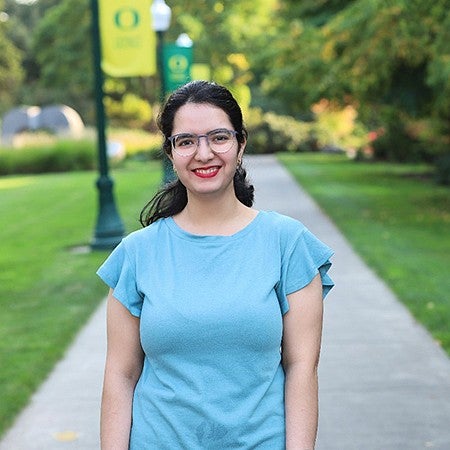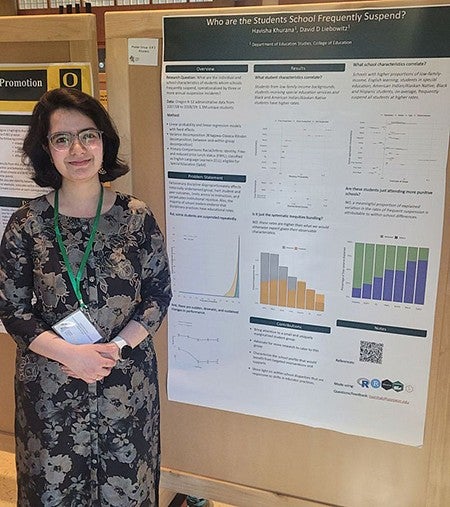
Learn more about Havisha Khurana, a Quantitative Research Methods in Education (QRME) student through our Student Research Spotlight series.
“I value the research culture I've encountered, which is marked by respectful collaboration, incorporating diverse perspectives, and nuanced interpretation of the findings while addressing systematic inequities.” – Havisha Khurana
Meet Havisha Khurana (Havi), a third-year Quantitative Research Methods in Education (QRME) PhD student. Havi's research is focused on projects related to school leadership, discipline, and reading outcomes with a data-science focus. The Data Science Specialization at the UO has given her experience managing large administrative datasets, summarizing data through effective visualizations, and employing various analytical approaches.
Havi credits Assistant Professor David Liebowitz and Professor Gina Biancarosa with playing a pivotal role in her academic journey and research endeavors. Recently, "Who Are the Students Schools Frequently Suspend?", a project she and Liebowtiz are working on together, was selected for the Office of the Vice President for Research and Innovation (OVPRI) Faculty Research Award. She also won Best Poster at the Graduate Research Forum on May 10.
In the future, Havi hopes to pursue policy-focused research advocating for policy improvements and promoting system-level accountability for historically forgotten student groups, both within the US and India.
Major: PhD in Quantitative Research Methods in Education and a Master's in Economics
Previous Education: Bachelor of Science (Honors) in Mathematics from St. Stephen's College, University of Delhi, India
Tell us about your work with COE faculty and your experience conducting research, including the "Who Are the Students Schools Frequently Suspend?" project.
I've worked with Professor David Liebowitz, who is also my PhD advisor, and Professor Gina Biancarosa, on projects related to school leadership, discipline, and reading outcomes. My work is mostly data-science-focused—a huge shoutout to the Data Science Specialization program at the COE: Professor Joseph Nese, Dr. Daniel Anderson, and Professor Cengiz Zopluoglu. Across projects, I've managed large administrative datasets, summarized data through effective visualizations, and employed various analytical approaches. These experiences have been fantastic, providing me with both nurturing support and challenging opportunities. I particularly value the research culture I've encountered, which is marked by respectful collaboration, incorporating diverse perspectives, and nuanced interpretation of the findings while addressing systematic inequities.

Why is this work important and what is its potential impact of the project?
Our project, “Who Are the Students Schools Frequently Suspend?”, delves into a pressing issue. Analyzing Oregon administrative data spanning over a decade, we found that a small percentage of students account for most of the suspension incidents annually. This trend contradicts the widely held belief among school leaders that disciplinary practices serve an educational purpose for students undergoing discipline. Our study is unique as we focus on how suspensions are distributed. Unsurprisingly, we found that the known disparities in 'who is suspended' extend to 'who is frequently suspended'. Specifically, students with disabilities, those from low socio-economic backgrounds, and Black and American Indian students are overrepresented among those who experience multiple suspensions per year. We consider our findings impactful as they shed light on a uniquely marginalized group of students, prompting the need for targeted interventions. If successful, these interventions could alleviate administrative burdens and generate positive effects throughout the system. Additionally, we used analytical methods that allude to the sources of disparities, providing insights into the level of intervention that would be effective based on specific contexts and objectives.
How have faculty played a role in your research and success? Have any particular COE faculty made a big impact on you?
The faculty at the COE have played a pivotal role in my academic journey, providing valuable guidance and support through various courses and research endeavors. I am especially grateful to my advisor, Professor David Liebowitz, whose mentorship has been instrumental in shaping my experience. He has always encouraged and supported me, providing exposure to several internal and external opportunities. I also greatly value Professor Gina Biancarosa's support; she has given me a lot of flexibility in exploring research questions using the DIBEL8 dataset and opportunities to present our work in diverse groups.
What are your career aspirations?
I want to pursue policy-focused research advocating for policy improvements and promoting system-level accountability for historically forgotten student groups, both within the US and India.
